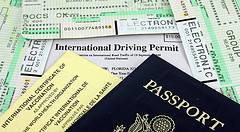Traveling overseas can be exciting and nerve-wracking. You can’t wait to enjoy the scenery and different cultures. But you also don’t want to embarrass yourself in front of a client or get yourself into a dangerous situation.
The key to avoiding trouble is of course planning. So to acclimate more quickly, conduct business more easily and enjoy yourself more, you need to consider the following:
1. Time Zones: Keep two master calendars for your trip – one for the time zone you’ll be in and one for the time zone at home. When I’m setting up a schedule for a trip, I’ll use the calendar for the time zone I will be in, whether I’m planning meetings there or calls home. I transfer those dates and times to my home-time calendar and leave it with my assistant to update. I also leave one at home with my family so they can keep track of me. To check time zones, check out worldtimeserver.com or timeanddate.com/worldclock.
2. Holidays: Every country has different holidays and people there usually think everybody knows what they are. So don’t get caught showing up to do business in the middle of a holiday. Even if your client is willing to work, public transportation and other services may not be available. So check online before you get there – wikipedia.org has a list of holidays by country.
3. Weather: Packing is a pain when you’re just going a few states over. When you’re heading overseas it can be even more daunting. Be sure to check weather.com for all your destinations. And remember that most of the world uses Celsius, not Fahrenheit. So be sure to double-check that you are too.
4. Currency: Most countries use a different currency than you have at home. You need to know what the local currency is where you’re going and how to convert it into your home currency. Bloomberg.com has a currency converter that will identify the local currency for the country (ies) you’re visiting and convert them into your home currency. To make it simpler on yourself, use a credit card as much as possible – especially for large ticket items, such as hotels, plane tickets and meals. You can also use your ATM card but be sure to only use it at a bank-based facility. Avoid the free-standing machines because they have been proven less secure.
5. Language: It’s not necessary to have much knowledge of the language of the country you’re visiting. But many business travelers find they get better treatment if they at least learn a few phrases to show they are trying. So learn the basics: hello; goodbye; please; thank you; yes and no and the numbers one through ten.
6. Risks, Warnings, Sanctions: Obviously in some parts of the world, the government is in flux and crime is rampant. Foreigners are easy targets, particularly women – so take extra precautions. Many women who work for global firms hire a local company to advise them on security issues before and during their trip. Often they will have a security team escort them to and from meetings – even dinner – and act as personal bodyguards. If you’re not part of a large organization, there are several resources you can check online for security information: Government travel warnings, U.S. Treasury sanctions and country risk forecasts. Risks, warnings and sanctions should be taken seriously.
7. Etiquette: Probably the most important subject to study before you travel internationally. What are the business customs and procedures for your destination? A faux pas could cost you business. Some cultures treat proper etiquette more seriously than we do in the U.S. Do research on gift giving, tipping, meeting protocol, food customs, even hand gestures. Other countries have different views of women in business so it’s good to learn what to do to fit in. A favorite resource for learning proper business etiquette is Culture Connect.
8. Entertainment: Another critical subject that shouldn’t be taken lightly. You should know what is expected of you wherever you are going. If you have colleagues in your host country, ask them. Also check with your human resources department. It’s hard to imagine a business trip overseas that doesn’t include some kind of client entertainment. Find out what is expected. And don’t wait until the last minute to make arrangements.
9. Sports: They may not be at the top of your favorite things list but sports play an important role in the culture of other countries, just like in the U.S. So take a few minutes to learn what sports are big in your destination so that you can show you’re taking an interest in the culture. Again, Wikipedia.org can be a great source of sports information for around the world.
For more global travel tips, check out my book - The Woman Road Warrior: An Expert’s Guide to Domestic and International Business Travel.
See you on the road!
Kathy Ameche
Traveler-in-Chief
Labels: business etiquette, business traveler, entertainment, international travel, language, overseas, security, sports, time zones, weather



















0 Comments:
Post a Comment
<< Home